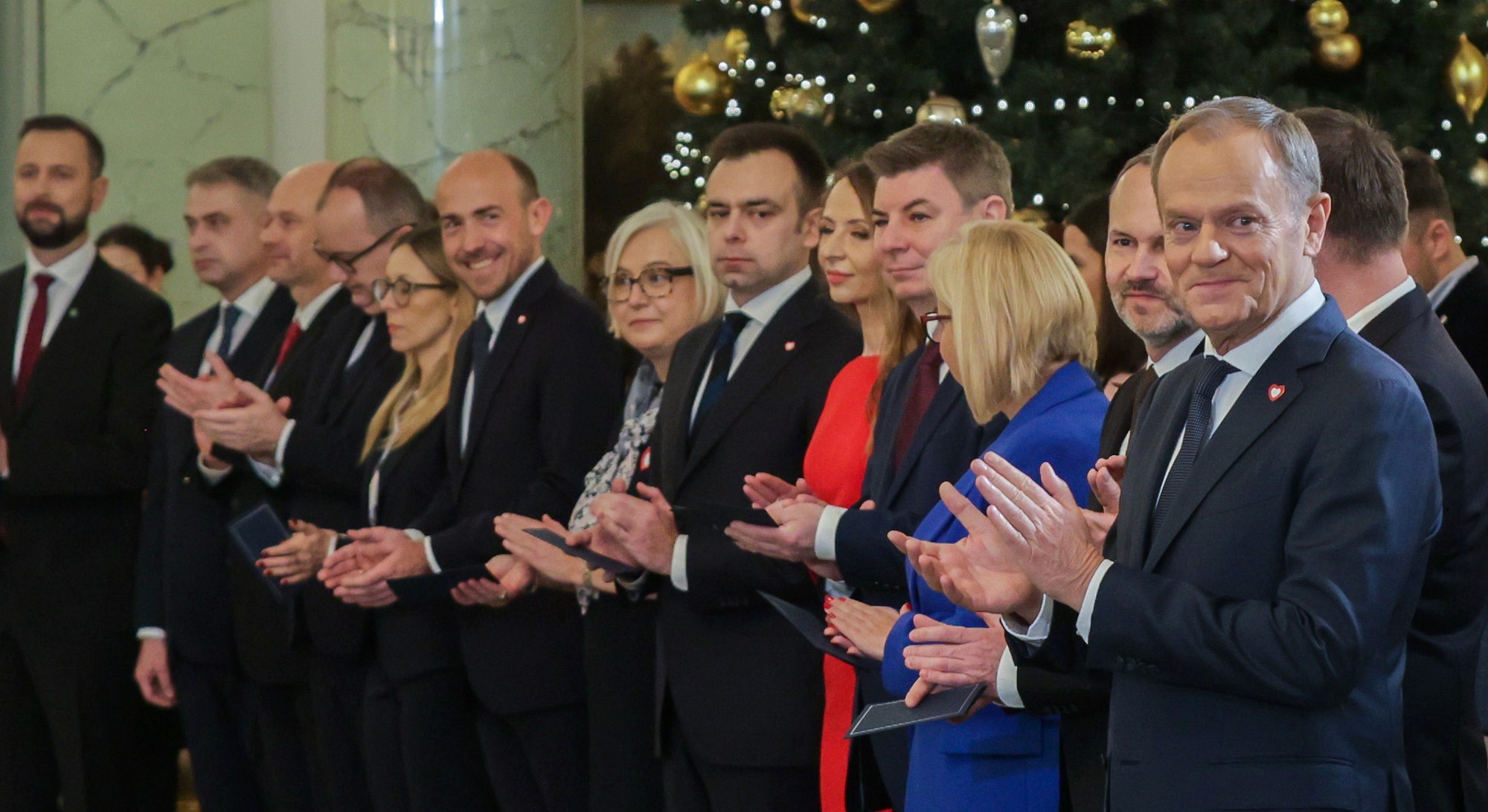Constitutional court judge questions legality of government after ministers used feminine titles in oath

A constitutional court judge, Mariusz Muszyński, has questioned the legality of the new Polish government because two of its female ministers used the feminine version of their title when being sworn in, thereby changing the wording of the oath indicated in the constitution (which uses the masculine form).
His argument has been ridiculed by one legal scholar, while Muszyński himself has also been found in multiple Polish and European court rulings to have been illegally appointed to the Constitutional Tribunal (TK).
Mariusz Muszyński: Dla „ministry” Barbary Nowackiej mam złą wiadomość. Odwołanie małopolskiej kurator Barbary Nowak jest nieważne. A sama „ministra” Nowacka nie jest urzędującym ministrem edukacji.https://t.co/X8ttW4FDAi
— Rzeczpospolita Prawo (@RPPrawo) December 20, 2023
In an article titled “Does Poland have a legal government?” for Rzeczpospolita, a leading newspaper, Muszyński notes that, when the new government was sworn in last week, two of its female ministers – Barbara Nowacka and Katarzyna Kotula – used the feminine form ministra instead of the masculine minister.
This left him with “serious doubts as to whether the [government] has been constituted” in a legal manner because the oath outlined in the constitution uses the masculine form.
In Poland, many professions are widely referred to using only their masculine form, even when a position is held by a woman. However, there has been a growing movement in recent years for feminine forms to be used, including for political titles such as minister and MP.
A group of female MPs have won the right to officially be named as „posłanka”, the feminine term for their position, rather than „poseł”, the masculine form that is normally used to refer to all MPs regardless of sex https://t.co/zRQfYymZli
— Notes from Poland 🇵🇱 (@notesfrompoland) November 26, 2019
In his text, Muszyński argued that such “errors during a ministerial oath are not insignificant mistakes” because the oath is “an element of the appointment procedure” as well as “a promise of specific conduct by the person making it”.
The judge pointed to the fact that Barack Obama took his oath of office upon becoming president a second time after saying the words – which are outlined in the US constitution – in the wrong order the first time.
Because Nowacka and Kotula “took an oath to assume functions unknown to the constitution and Polish law”, they were not legally appointed and their decisions do not have validity, argued Muszyński.
Droga @rzeczpospolita – serio? Publikujecie satyryczne teksty? Mało jest poważnych autorów i poważnych problemów prawnych? 🤦https://t.co/ONbEdbyCKy
— Witold Zontek (@WitekZontek) December 20, 2023
Moreover, decisions made by the government as a whole can now be called into doubt because some of its members were not legally appointed, he added.
Muszyński’s arguments were, however, ridiculed by Witold Zontek, a legal scholar at the Jagiellonian University in Kraków. He sarcastically asked Rzeczpospolita why it had published a “satirical text” and suggested that Muszyński was not a “serious author”.
The latter is likely a reference to the fact that Muszyński was one of three judges appointed by the former PiS government and President Andrzej Duda in 2015 in place of three candidates chosen under the former government. Those appointments have been found by courts to have been illegitimate.
The ECHR has ruled that Poland’s constitutional court is not a “tribunal established by law” as it contains a judge illegitimately appointed by the ruling PiS party and president
It is the first ruling of its kind, and could open the way for further cases https://t.co/oKkvK1yv2f
— Notes from Poland 🇵🇱 (@notesfrompoland) May 7, 2021
The use of feminine forms of job titles known as “feminatives” (feminatywy) – has been a controversial issue in Poland. Some women prefer to use them, arguing that such forms are a symbolic expression of gender equality.
“It has enormous symbolic significance, because it means that the visibility of women in politics is much greater,” said left-wing MP Wanda Nowacka after successfully campaigning for feminine forms to be used in parliament in 2019.
“Not only will that help us at work, but social awareness will increase so that young girls and women…think in terms of having the right to function on an equal basis in the public space,” she added.
When presenting his new government to parliament, Prime Minister Donald Tusk used both the male and female forms of the word “minister”, stressing that “with us there is no dogma.”
Is it OK to refer to a black person as „murzyn” in Polish?
Should women’s professional titles take feminine endings?
Is „homosexualiści” an acceptable term for gay people?
The University of Warsaw has issued a guide on „non-discriminatory language” https://t.co/559uuqrRWZ
— Notes from Poland 🇵🇱 (@notesfrompoland) January 27, 2020
However, feminatives have also been a subject of criticism and mockery, with some even seeing them as a dangerous challenge to accepted norms.
Former PiS Prime Minister Beata Szydło even went as far as calling the female forms of nouns “a dangerous phenomenon” and “leftist newspeak”.
“This is nothing other than the implementation of neo-Marxist theories presupposing the seizure of language,” she wrote on X after some new ministers used femine forms while being sworn in. “The left wants to control society by controlling language. We cannot allow this to happen.”
Pani Kotula nazywa siebie „ministerką”, pani Dziemanowicz-Bąk „ministrą”. Jeśli już psujecie język polski swoją lewacką nowomową, to bądźcie chociaż w tym konsekwentne, szanowne Panie. To raz.
A dwa, że możemy sobie żartować, ale to co obserwujemy, czyli wprowadzanie nowomowy do…
— Beata Szydło (@BeataSzydlo) December 14, 2023
Commenting on the situation, former President Bronisław Komorowski – who is aligned with the new government – told broadcaster Radio Zet that, even though he respects women’s preferences for the female forms of nouns, in formal situations he would expect the constitutional provisions to be respected.
“It is not possible to say that we support the constitution and invoke it in all other matters, but not in the linguistic ones,” he argued.
According to experts, feminine forms are natural in Polish and were widespread until the communist era. Writer Jacek Dehnel argues that the grammatical debate is really about “the place of women in society and their subjectivity”.
Feminatives do not bother anyone when used in professions such as “cleaner” and “servant”, Dehnel notes, but only when used for positions of authority such as “professor” or “prime minister”.
Jak mówić: Minister, ministra, ministerka? Bronisław #Komorowski wskazuje na #konstytucja
Kliknij w zdjęcie, by przeczytać więcej🔽https://t.co/S02p9BzP1B
— Rzeczpospolita (@rzeczpospolita) December 15, 2023
Main image credit: Przemysław Keler/KPRP
Agata Pyka is an assistant editor at Notes from Poland. She is a journalist and a political communication student at the University of Amsterdam. She specialises in Polish and European politics as well as investigative journalism and has previously written for Euractiv and The European Correspondent.






